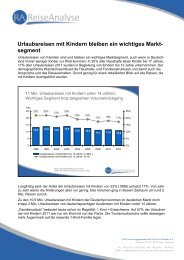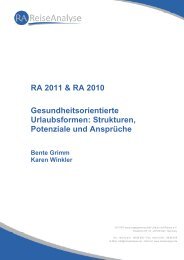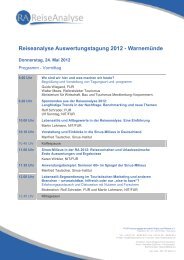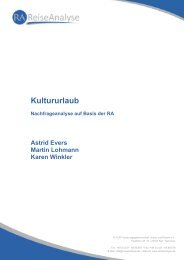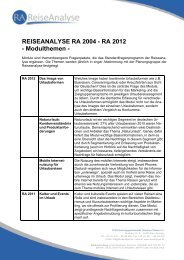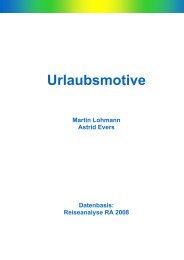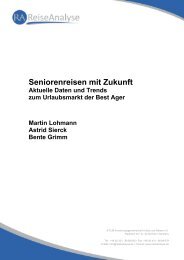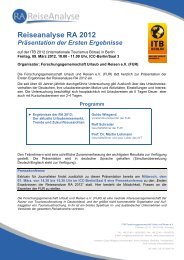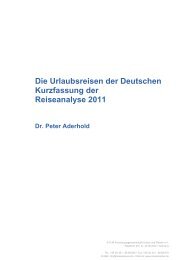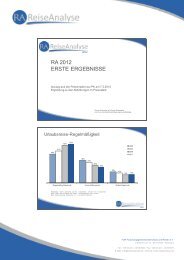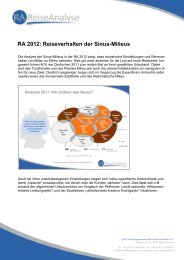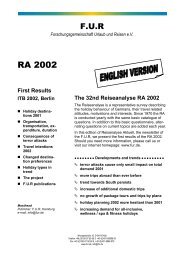Dr. Peter Aderhold Büro für Tourismusforschung + Planung
Dr. Peter Aderhold Büro für Tourismusforschung + Planung
Dr. Peter Aderhold Büro für Tourismusforschung + Planung
You also want an ePaper? Increase the reach of your titles
YUMPU automatically turns print PDFs into web optimized ePapers that Google loves.
<strong>Dr</strong>. <strong>Peter</strong> <strong>Aderhold</strong><br />
<strong>Büro</strong> <strong>für</strong> <strong>Tourismusforschung</strong> + <strong>Planung</strong><br />
Soestraede 2, DK 3460 Birkeroed / Kopenhagen - Dänemark<br />
Tel 0045-4581 4246 Email: aderhold@aderhold.dk<br />
Liebe Freunde,<br />
gut ein Jahr nach meinem „Rückzug“ als Geschäftsführer der FUR, will ich jenen, die es interessiert,<br />
einen kurzen Bericht geben über mein Leben nach diesem Rückzug aus dem aktiven Berufsleben.<br />
Ganz ist die RA, mit der ich mich seit meiner Doktorarbeit 1972 beschäftigt habe, (noch) nicht aus<br />
meinem Leben verschwunden, denn 2011 und 2012 bin ich noch <strong>für</strong> die Ausarbeitung des Berichtsbandes<br />
der RA 2011 und 2012, der Kurzfassung und der englischen Fassung des Berichts-bandes verantwortlich<br />
und habe auf diese Weise noch Kontakt zur RA und meinem „alten Leben“.<br />
Auch mein eigenes Beratungsbüro halte ich <strong>für</strong> Problemstellungen, die mich interessieren, noch offen.<br />
Darüber hinaus habe ich mich – auch auf der Basis der RA – mit einem Thema beschäftigt, mit dem ich<br />
mich seit vielen Jahren – u.a. auf Bali - engagiert habe: dem Tourismus in Entwicklungsländern und der<br />
Frage, wie Tourismus sich mit Vorteil nicht nur <strong>für</strong> die Touristen, sondern <strong>für</strong> die einheimische<br />
Bevölkerung als Entwicklungs-Strategie in III.-Weltländern gestalten lässt.<br />
Auf der Basis einer von mir geschalteten Exklusivfrage in der RA 2011 habe ich die Nachfrage nach<br />
Urlaubsreisen in III.-Weltländer und deren Segmente untersucht, sowohl <strong>für</strong> die Entwicklungsländer<br />
insgesamt wie auch ausgewählte Länder Asiens. Ein Beispiel auch, wie sich die RA auch <strong>für</strong> speziellere<br />
Problemstellungen gut nutzen lässt.<br />
Unter anderem geht es dabei auch um das Interesse <strong>für</strong> „Community Based Tourism (CBT)“, also<br />
Urlaubsreisen in kleinen, vom Tourismus noch unberührten Regionen/Gemeinden und den Möglichkeiten<br />
und Gefahren im Zusammenhang mit dieserart von Tourismus.<br />
Einige der Ergebnisse dieser Analyse sind im Juli 2011 in einer internationalen Fachzeitschrift (Contours)<br />
veröffentlicht, die sich speziell mit Fragen des Tourismus in Entwicklungsländern beschäftigt.<br />
Für diejenigen, die sich da<strong>für</strong> interessieren, sei verwiesen auf folgende Website: www.ecotonline.org und<br />
hier siehe Contours Vol 21, Juli 2011) bzw. den Auszug in der Anlage zu diesem kurzen Bericht.<br />
Die Ergebnisse dieser Analyse sind Ausgangspunkt und Basis eines neuen Beschäftigungsfeldes <strong>für</strong><br />
mich, nämlich der Umsetzung dieser Ergebnisse in nationale und regionale Tourismus-Entwicklungspläne<br />
ausgewählter Länder und konkrete CBT-Projekte in diesen Ländern. Zurzeit arbeite ich in diesem<br />
Zusammenhang mit dem „Community Based Tourism Institute“ der Universität von Chiang Mai in Nord-<br />
Thailand zusammen und bin im Kontakt mit Tourismus-Ministerien in verschiedenen Ländern.<br />
Innerhalb dieses neuen Engagements war ich im letzten Jahr mehrere Monate in Vietnam, Thailand, Sri<br />
Lanka und auf Bali und habe mit Organisationen/Personen, die sich mit CBT beschäftigen, zusammengearbeitet,<br />
aber auch das stressfreie Leben in diesen schönen Ländern und deren so andersartigen Kultur<br />
und Lebensweise erleben dürfen, und zwar nicht mehr nur aus der Touristen-Perspektive, sondern als<br />
jemand, der dort -zeitweise - lebt. Eine richtig schöne Erfahrung und Bereicherung.<br />
Darüber hinaus habe ich jetzt Zeit und Gelegenheit, nach „neuen Themen Ausschau zu halten“, die nichts<br />
mit Tourismus zu tun haben, <strong>für</strong> mich aber auch interessant und wichtig sein können.<br />
Trotz dieser insgesamt positiven Entwicklung will ich aber auch nicht verschweigen, dass der Übergang<br />
vom sehr aktiven und engagierten Berufsleben zu einem geruhsamen Leben ohne konkrete (Arbeits-)<br />
Aufgaben nicht ganz einfach war ... und immer noch nicht ist. Ich habe schon sehr deutlich erlebt, wie<br />
sehr mein berufliches Engagement <strong>für</strong> die RA und die FUR mein Leben und mein Selbstverständnis<br />
bestimmt hat, wie sehr sich meine Zufriedenheit aus der „ordentlichen“ und erfolgreichen Lösung von<br />
beruflichen Problemen gezogen habe ... und ich jetzt habe „lernen“ müssen, meine Zeit sinnvoll<br />
einzusetzen und meine Zufriedenheit aus anderen Quellen als der Arbeit zu beziehen ... eine Erfahrung,<br />
die viele machen, die so engagiert in ihrem Beruf aufgehen, wie dies auch bei mir der Fall gewesen ist.<br />
Allen meinen alten Geschäftspartnern und Freunden wünsche ich auf diesem Wege alles Gute und<br />
möchte mich noch einmal <strong>für</strong> die jahrelange, gute Zusammenarbeit bedanken.<br />
Mit besten Grüßen<br />
<strong>Peter</strong> <strong>Aderhold</strong>
4<br />
IN FOCUS<br />
Community Based Tourism in Sustainable<br />
Tourism Development: Great Potential<br />
with Risk<br />
By <strong>Dr</strong>. <strong>Peter</strong> <strong>Aderhold</strong>l<br />
Community Based Tourism (CBT), seen as tourism in smaller communities away from<br />
and untouched by (mass) tourism enabling closer contact with local populations and<br />
their environment, can be incorporated as a significant element of sustainable tourism<br />
development strategy. The analysis and insights below come from research into<br />
expectations of German tourists. ECOT welcomes research by analysts into other<br />
settings.<br />
Community Based Tourism (CBT) offers an<br />
opportunity to holiday in a country and get to know<br />
it, but is as yet known to and taken up by only a<br />
very small number of people. For this reason a special<br />
investigation was carried out on the German market – the<br />
largest and most developed holiday market in the world – to<br />
determine the size and market potential in Germany for this<br />
special form of holiday.<br />
In the course of the 2011 German Travel Analysis almost<br />
8,000 Germans were asked, in personal interviews, what<br />
manner of holiday they would most prefer to spend in<br />
a developing country. The results are representative for<br />
residents of Germany aged over 14. Preferences were<br />
investigated with the help of a list of 10 descriptions of<br />
how a holiday in a developing country could be spent. The<br />
analysis presented here is based on those people who<br />
• had holidayed in a developing country at least once in the<br />
last three years (2008-2010), or<br />
• had “fairly firm plans” to spend a holiday in a developing<br />
country in the following three years (2011-2013), or for<br />
whom such a holiday was a possibility.<br />
As can be seen from Fig. 1, the preferred form of holiday in<br />
these countries is a combination of a tour to get to know the<br />
main sights of the country, and a beach holiday (58%).<br />
Just fewer than 30% gave beach holiday only as their<br />
preference, this number of course varying considerably from<br />
destination country to destination country. The proportion of<br />
those preferring a pure beach holiday might be significantly<br />
greater for the Caribbean than, for example, for Indonesia.<br />
CONTOURS Vol.21, No.2, July 2011<br />
Fig. 1: Preferences of potential III.World tourists (%)<br />
Source: <strong>Dr</strong>. <strong>Peter</strong> <strong>Aderhold</strong> © German Holiday Survey RA 2011<br />
Besides these basic holiday types (beach holiday, tour<br />
and combination of both) a range of special interests were<br />
mentioned such as cultural attractions (40%) or more<br />
adventurous experiences off the beaten track (27%).<br />
Further, some 38% of the potential holiday-makers to<br />
developing countries express special interest in “experiencing<br />
more about the lives of local people” and 19% said that they<br />
“would like to experience the closest possible contact with<br />
the local population.” The preferences expressed here were<br />
multiple selections, i.e. respondents could each choose more<br />
than one option.<br />
On the basis of these results, the market potential for CBT<br />
was established as follows:<br />
All respondents who …<br />
• wish to take a holiday in a developing country in the next<br />
three years, AND
• would prefer to stay in a small, simple hotel with typical<br />
local atmosphere rather than in an international hotel,<br />
AND<br />
• at the same time would like to experience “as much as<br />
possible about the lives of local people” or “the closest<br />
possible contact with local people”<br />
… can here be considered as potential CBT tourists.<br />
A total of 19% of all 15.2 million potential holiday-makers to<br />
developing countries from Germany meet these conditions,<br />
which corresponds to a potential interest in CBT of some 3<br />
million people over the next three years.<br />
Fig. 2: CBT potential in the German market 2011-13 in<br />
selected Asian countries<br />
Source: <strong>Dr</strong>. <strong>Peter</strong> <strong>Aderhold</strong> © / German Holiday Survey RA 2011<br />
% Million<br />
India 27 1.2<br />
Sri Lanka 21 1.3<br />
Thailand 17 1.8<br />
Vietnam 28 0.9<br />
Malaysia 23 1.0<br />
Indonesia 24 0.9<br />
If we examine the potential interest for CBT for a selection of<br />
Asian countries we see that the proportion of those interested<br />
in CBT varies significantly from country to country. While<br />
interest in CBT from potential holiday-makers to India and<br />
Vietnam is almost 30%, the corresponding figure for potential<br />
travellers to Thailand is ‘only’ 17%. However, taking into<br />
account the sheer size of the potential for these countries, we<br />
can see that some 1.8 million holiday-makers from Germany<br />
with an interest in visiting Thailand have admitted an interest<br />
in a CBT holiday. Of course, not all these will actually fulfil<br />
their wish to visit Thailand in the next three years, and of<br />
those who do, not all will actually take a CBT holiday. It<br />
remains clear, however, that the interest is there – and it is<br />
huge!<br />
The varying amount of CBT interest in the different<br />
countries can be explained mainly by the fact that countries<br />
with significant and well-developed tourist demand, such<br />
as Thailand, have a large proportion of beach tourists, who<br />
often have little experience of travel. Relatively ‘new’<br />
holiday destination countries, such as Vietnam, on the other<br />
hand, attract greater numbers of inquisitive and experienced<br />
travellers, of whom a greater proportion are interested<br />
in CBT than are the ‘traditional’ holiday makers, who are<br />
more interested in relaxing, swimming and sightseeing.<br />
The total interest potential for each country is greater<br />
than the 3 million potential interested customers. This has<br />
IN FOCUS 5<br />
methodological reasons, because polling CBT potential for<br />
individual countries results in values greater than those from<br />
examination of the potential interest in CBT in general.<br />
If we compare the structure of CBT interest with the (German)<br />
population and the potential holidays in developing countries<br />
in total, we get the following picture:<br />
Fig. 3: Socio-demographic characteristics of potential<br />
CBT holidaymakers<br />
Source: <strong>Dr</strong>. <strong>Peter</strong> <strong>Aderhold</strong> © / German Holiday Survey, RA 2011<br />
German<br />
Population<br />
Travellers<br />
Potential<br />
3 rd World<br />
CBT<br />
Potential<br />
People (millions) 70.5 15.2 2.95<br />
Age % % %<br />
14-19 8 11 11<br />
20-29 14 22 25<br />
30-39 15 17 18<br />
40-49 19 22 21<br />
50-59 16 16 14<br />
60-69 14 8 7<br />
70+ 16 4 4<br />
Average age<br />
Education<br />
47 40 39<br />
Elementary 44 28 23<br />
Secondary 35 39 38<br />
Higher<br />
Social strata<br />
22 34 39<br />
High 23 34 37<br />
Medium 53 54 53<br />
Low<br />
Internet<br />
24 12 11<br />
Access 70 89 93<br />
Info 49 71 80<br />
Booking 29 46 51<br />
From the point of view of age, potential CBT travellers<br />
are not significantly different from developing country<br />
holiday makers in total. However, highly educated people<br />
are disproportionately represented among those interested in<br />
CBT compared to the total population, but also in comparison<br />
to the potential developing country tourists. The same applies<br />
to the upper social class.<br />
In this context, some 93% of those interested in CBT have<br />
internet access, 80% of them use the internet for information<br />
on their planned destination and more than 50% make whole<br />
or partial holiday bookings online. We are clearly dealing<br />
with an internet-savvy and experienced group of people.<br />
Vol.21, No.2, July 2011 CONTOURS
6<br />
IN FOCUS<br />
CBT provides opportunities for contact with local people and their culture.<br />
Features that emerge<br />
The results of the analysis of the German market show<br />
therefore that<br />
• there is a significant market or potential interest in CBT,<br />
which is possibly considerably greater than the available<br />
current supply,<br />
• those potentially interested in CBT are generally<br />
experienced travellers with a higher than average level of<br />
education and a large proportion of people from the middle<br />
and upper social classes, and<br />
• these people are internet-savvy and experienced and use<br />
the internet for information and booking to a greater extent<br />
than most other tourists.<br />
These results apply not only to the German market, but, as<br />
other studies have shown, can be said to apply to most other<br />
European countries, for example, Austria, Switzerland, The<br />
Netherlands, Denmark, Sweden and Norway.<br />
The bottleneck in CBT<br />
The bottleneck for the development and further growth of<br />
CBT lies therefore not in lack of demand, but rather in a<br />
lack of<br />
• consumer knowledge of the existence of CBT, and<br />
• mass market access to potential CBT travellers.<br />
This is therefore primarily a marketing problem, explained<br />
CONTOURS Vol.21, No.2, July 2011<br />
www.ecoteerresponsibletravel.com<br />
by the fact that individual CBT projects are, as a rule, freestanding<br />
and do not have an umbrella group to help them<br />
with this. However, there are some very successful examples<br />
of CBT projects that have, to a greater or lesser extent, solved<br />
these problems. For example,<br />
• the activities and projects of “The Thailand Community<br />
Based Tourisms Institute“ at Chiang Mai University (www.<br />
cbt-i.org), or<br />
• a list of other successful projects of “Socially Responsible<br />
Tourism“, as regularly presented by the ToDo-Contest at<br />
ITB (Germany’s Internationationale Tourismus Börse)<br />
since 1995 (www.to-do-contest.org).<br />
Attempts to market this kind of tourism through traditional<br />
distribution channels such as tour operators’ catalogues<br />
have generally met with limited success. This is because<br />
tour operators make relatively little commission on these<br />
products. (This is exactly what the service providers<br />
intended, as the money is, after all, intended to flow into<br />
the communities themselves and not into the pockets of the<br />
international tourism industry). Indeed where such products<br />
are included (if at all) in such catalogues, it is often for<br />
image-related reasons. Furthermore, the typical potential<br />
CBT holiday maker is well travelled and probably not a<br />
traditional tour operator customer (with the exception of<br />
the very few operators specialising in sustainable tourism).<br />
These customers therefore tend to avoid the traditional<br />
tourism industry, preferring to travel independently and ‘off<br />
their own bat’. Some 40-60% of these people prefer to travel<br />
totally independently, making all their own arrangements.
They tend also, as mentioned, to be very internet-savvy and<br />
to use mostly this new medium for holiday information and<br />
bookings.<br />
One considerable marketing challenge therefore would seem<br />
to be the development of an internet platform on which CBT<br />
products can be made available for information and booking,<br />
nationally, regionally or even worldwide.<br />
However, the development and implementation of CBT is not<br />
purely a matter of marketing. The first – and most important<br />
– step is obviously the careful and sensitive development<br />
of individual CBT projects in often under-developed regions<br />
and communities. While most CBT projects offer a relatively<br />
simple experience from a technological point of view in<br />
as far as accommodation facilities are concerned (simple,<br />
local-style accommodation), the problems to be solved in<br />
the development of these projects are both complex and<br />
technical, as each project is highly different and requires<br />
individualised solutions. Training of all people involved in<br />
the CBT project will therefore be crucial to the success – or<br />
otherwise – of the projects.<br />
Because CBT projects, in their capacity of “Socially<br />
Responsible Tourism”, (should) claim that<br />
• the economic effects benefit the entire community (and<br />
not only local ‘big shots’) and so are of a participative,<br />
inclusive nature, and<br />
• the social, cultural and environmental impacts on these<br />
untouched communities are kept within acceptable limits<br />
or are avoided completely, and<br />
• the expectations of CBT guests of an authentic experience<br />
of life in the host community are not only very high but<br />
need to be met if this form of tourism is to meet with long<br />
term success,<br />
great insight and experience will be required to develop and<br />
implement these projects. There are some excellent examples<br />
of how this can be successfully organised. (See the examples<br />
from Thailand and the ToDo contest mentioned above).<br />
However, there are also unfortunately many cases of CBT<br />
projects where the results have been exactly the opposite of<br />
what was originally intended and more economic, cultural,<br />
social or environmental harm has been caused than if the<br />
sensitive CBT approach to development had not been<br />
attempted.<br />
While there certainly are opportunities for successful<br />
sustainable tourism development through CBT, we would<br />
do well not to underestimate the risks.<br />
IN FOCUS 7<br />
www.tourismconcern.org.uk<br />
Interaction between the hosts and tourists is a key feature of CBT<br />
Considerable knowledge and experience of CBT planning<br />
is required in order to develop and implement this form of<br />
tourism successfully and to secure the advantages of CBT<br />
for tourism development in underdeveloped regions.<br />
It is worth considering bringing interested and experienced<br />
partners together in an international workshop or seminar to<br />
develop an organisational structure that<br />
• can provide help with planning, development and<br />
implementation by the systematic use of experience of<br />
successful CBT projects, and<br />
• takes on the development of an internet platform for the<br />
marketing of individual CBT products or at least provides<br />
help to this end.<br />
One aim could be to establish an international network<br />
bringing together and supporting communities, regions,<br />
organisations and individuals with an interest in CBT.*<br />
It is also entirely possible that development aid or similar<br />
organisations could provide financial or organisational<br />
support. CBT development after all constitutes a particularly<br />
concrete form of sustainable tourism, which not only satisfies<br />
but more than fulfils current development aid criteria.<br />
<strong>Dr</strong> <strong>Peter</strong> <strong>Aderhold</strong> is a specialist in marketing and market research in<br />
tourism. He has been associate professor at the Institute of Transport,<br />
Tourism and Regional Science of the Copenhagen Business School<br />
and head of its Tourism department. Author and co-author of a series<br />
of articles and books on tourism development and market research,<br />
he has had wide experience as a Consultant, including on sustainable<br />
tourism development projects and regional development plans.<br />
* <strong>Dr</strong> <strong>Aderhold</strong> and ECOT are interested in pursuing this suggestion and<br />
its implications. We would be keen to hear expressions of interest from<br />
relevant groups.<br />
Vol.21, No.2, July 2011 CONTOURS



